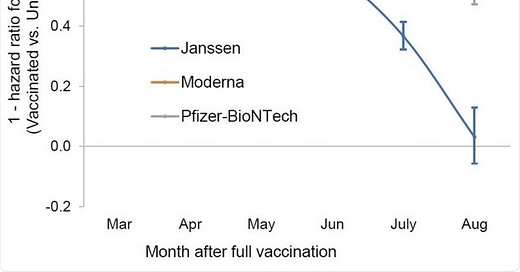
RED ALERT: IS FDA'S QUIET OCTOBER REORGANIZATION CREATING A NEW POLICING ARM A RESPONSE TO WEF'S DEMANDS TO CONTROL OR SHUT DOWN LOCAL FOOD PRODUCTION?
Obedience to globalist masters predicted to backfire. If you object, grow more food than you ever have before as a direct response to WEF's audacity and attempt at overreach. Watchdogs: Watch the OII.
If the FDA’s new enforcement capabilities are used to crack down on local food production in favor of large-scale, centralized operations, the country’s food supply will become increasingly controlled by multinational corporations and global standards, rather than the needs and desires of local communities and individuals. Here is evidence that the WEF is wrong on carbon.
On October 1, 2024, the FDA, the U.S. agency responsible for protecting public health by ensuring the safety of food, drugs, and medical devices, undertook its largest reorganization in decades. This restructuring created the Office of Inspections and Investigations (OII), a new policing arm designed to oversee and enforce regulations across all FDA-regulated products. The FDA has presented this as part of a broader strategy to “modernize” the agency and respond to global challenges such as emerging technologies, food safety concerns, and the impacts of “globalization” (see: FDA Modernization Efforts for Establishing a Unified Human Foods Program, New Model for Field Operations and More).
From the FDA’s web page: “The FDA is focused on transforming the agency to be more efficient, nimble and ready for the future with the ever-changing and complex industries we regulate, including the emergence of new food technologies, the impacts of globalization, climate change and other factors that require the FDA to quickly adapt to an evolving world. ”
There are concerns that this reorganization is a response to calls from global organizations, particularly the World Economic Forum (WEF), for coordinated international efforts to combat issues like climate change and, more recently, calls for global control and influence over local food production.
From this report:
“Economic Shifts: Will nations engage in cooperative trade through open markets or adopt more isolationist policies? How will confidence in commodity markets evolve? Will markets be more resilient or more volatile? Will the price of food accurately and consistently capture the externalities of health costs and environmental impact? What will be the impact of trade policies on global and local markets? Will there be an increased number of breadbaskets that supply most of the world’s food? Will food systems become more centralized or more localized and where will decision-making power be held?”
The WEF, an unelected body of influential political and corporate leaders, has promoted far-reaching agendas to transform global food systems, including demands for reduced meat consumption. A WEF-funded study alleges that urban food gardens produce more carbon than large agriculture. Globalists cite ‘food waste’, ignoring that scraps are used to feed fowl that control insects, and can be used in compost. The group, citing environmental concerns, seems desperate to have say over locals, regardless of which country they reside.
The FDA’s pivot toward a more centralized model of inspections and investigations raises questions about whether U.S. public health needs drive the agency’s realignment or whether it is positioning itself to enforce global directives that could undermine local food sovereignty.
This reorganization is particularly alarming to advocates of local, sustainable agriculture, as the FDA's enhanced focus on global challenges may lead to regulations that favor large-scale industrial food systems over small, local producers. With the WEF and other global entities increasingly advocating for sweeping changes in control over food production, distribution, and consumption, the FDA’s shift raises concerns about whether these OII will ultimately serve the public interest or contribute to a broader agenda prioritizing global standards over national sovereignty.
At the heart of the debate is a question of priorities: is the FDA still primarily focused on protecting American consumers, or has it become an instrument for enforcing international policies designed to reshape the food system on a global scale? As the agency expands its enforcement capabilities through the OII, it remains to be seen whether these efforts will align with the needs of local food producers and consumers or whether they will serve to implement globalist policies that prioritize climate goals over individual freedoms.
Creating the Office of Inspections and Investigations (OII) as part of the FDA’s reorganization introduces a new layer of authority within the agency that significantly expands its reach. Previously, the FDA’s oversight was primarily focused on ensuring that food, drugs, and medical devices met safety and efficacy standards, with its Office of Regulatory Affairs handling inspections and enforcement. The OII, however, represents a shift in how the FDA will approach its regulatory responsibilities, with an increased emphasis on inspections, investigations, and the power to enforce compliance across a broader range of products.
This expanded scope raises concerns about the potential for mission creep—where the FDA, through the OII, may begin policing areas that traditionally fell outside its immediate mandate. Under the guise of public safety and adapting to global challenges, the OII could start enforcing policies that align with international directives, such as those promoted by the World Economic Forum, rather than prioritizing U.S. law and the needs of American citizens.
One area where this mission creep could manifest is controlling food production by small, organic farmers and farmers’ market distribution, particularly in regulating locally-grown food. Local agriculture currently helps meet the demand efficiently and with fewer pesticides and herbicides. The WEF’s recent push to control locally-grown food production based on its environmental impact—claiming that such practices contribute disproportionately to carbon emissions—may provide the perfect pretext for the OII to step in and regulate, or even criminalize, small-scale farming. The OII might use food safety standards to shut down local food producers. “Climate”-driven restrictions on how Americans grow their food, all in the name of reducing carbon footprints, is not welcome to a country that cherishes their individual rights.
The danger here is clear: by broadening its enforcement mandate, the FDA’s new policing arm may gradually adopt globalist policies that conflict with U.S. food sovereignty and local farming traditions. The OII’s mission could evolve from ensuring safety to enforcing compliance with global climate goals, including restricting local gardens and small, private organic farms that have long been a staple of sustainable, local food production in the U.S. Once the OII starts down this path, the potential for expanding its policing powers further is real, posing a significant threat to food sovereignty, local agriculture, the rights of individuals to choose their way of life, and the rights of American citizens to control their own food sources.
In this context, concerns exist that the FDA’s reorganization represents more than just a bureaucratic shift. Instead, it could be - per their own language citing “globalism” - the beginning of a slippery slope where the agency's increased enforcement capabilities are used to impose restrictions that align with globalist agendas rather than the needs and interests of the American public. If left unchecked, this transformation could ultimately erode individual freedoms and pave the way for a future where the FDA's primary role is to enforce international standards rather than protect U.S. public health and food security.
FOUNDATIONAL FLAWS IN THE WEF/FDA IDEOLOGY
The potential enforcement of globalist agendas through the FDA’s newly empowered Office of Inspections and Investigations (OII) becomes particularly alarming when considering the World Economic Forum’s “Net Zero” initiatives. Among ending private car ownership (and anything else) and eating insects, one of the WEF's most controversial proposals is a push to control local food production, under the claim that urban farming, personal gardens, and small-scale agriculture contribute disproportionately to carbon emissions, are inefficient - or - get this - can’t handle the burden “alone”. The WEF-funded study found that urban gardens produce a larger carbon footprint than large-scale industrial farms due to the materials and infrastructure used in urban and individual farming, such as raised beds, composting, and garden sheds.
WEF is Tone-Deaf to The Harms of Big Ag
Their argument is deeply flawed, as it overlooks the true environmental costs of industrial food practices and the cost of supply chains. It is well known that centralized Big Ag practices harm soil; that’s evident with the loss of nutritional value of foods grown in nutrient and mineral-depleted soils (especially selenium). Their use of pesticides, herbicides, and tilling practices harm the soil’s bacterial microbiome and all-important fungal mycorrhizae, which provide essential aeration for the soil microstructure to function well for plant growth and nutrition..
Although some of the WEF’s literature mentions sustainability, it is noteworthy that WEF’s literature does not call for an end to or even to reduce the use of pesticides, herbicides, and harmful tilling practices. The widespread use of pesticides, insecticides, and chemical fertilizers by Big Agriculture has led to a catastrophic decline in insect populations worldwide. Industrial farming practices, driven by the need for high yields and monoculture crops, have decimated vital insect species, including pollinators like bees and butterflies and natural pest controllers such as ladybugs and predatory beetles. This mass die-off disrupts ecosystems and threatens global food security, as many crops depend on these insects for pollination. The excessive use of agrochemicals contaminates soil and water, further destroying habitats and reducing biodiversity. Without a shift toward sustainable, organic farming practices that nurture rather than annihilate insect populations, we risk the collapse of essential ecological services that sustain agriculture and the environment.
WEF WRONG ON CARBON
Two additional essential points lay bare WEF’s assumption that local farming produces more carbon is false:
First, a June 2024 study published in the Soil Science Society of America Journal 1 by researchers from Kansas State University found that soil treated with organic fertilizers like compost and manure sequesters significantly more carbon than soil treated with chemical fertilizers or left untreated. This discovery underscores the critical role organic, sustainable farming practices play in mitigating carbon emissions by enhancing soil’s natural ability to store carbon. Practices like permaculture foster a dynamic and thriving local ecosystem of soil, plants, pollinators, and predators that produce abundant food.
The findings challenge the WEF's narrative that locally-grown or small-scale farming has a detrimental environmental impact. Instead, organic and local agriculture practices are shown to be essential in the fight against climate change, promoting healthier soils and capturing carbon more effectively than industrialized farming techniques. This demonstrates that rather than controlling or banning locally-grown food, policies should encourage - and otherwise leave alone - sustainable and regenerative local food production as part of broader efforts to reduce global emissions. Unless, of course, they want to ban glyphosate.
Second, food supply chains—food processing, transportation, packaging, and retail—account for a staggering 18% of food-related emissions. The energy required to convert farm produce into processed goods, the fossil fuels burned to transport food across vast distances, and the resources consumed in packaging and retail far outweigh the minimal emissions from local food production. Local agriculture obviously cuts these emissions by eliminating the need for long-distance transportation, reducing packaging waste, and minimizing the energy used in food processing.
Despite this, the WEF policies focus on curbing small-scale food production in favor of large, centralized agricultural systems. If the FDA, through its new OII arm, begins enforcing policies based on such globalist directives, it would prioritize industrial agriculture—the system responsible for the bulk of emissions—over sustainable, local food production, leading to increased harm to arable soil. This misdirection is troubling because eating local is proven to be a critical factor in reducing the carbon footprint of food consumption. By supporting local farmers, community gardens, and home-grown food, we reduce reliance on the resource-intensive processes that dominate industrial agriculture.
The WEF’s argument that there must global control over local food production reveals a deeper agenda: centralizing control over the global food supply. By pushing for restrictions on personal and local farming under the pretext of reducing carbon emissions, global organizations are moving toward a future where food production is tightly controlled by large-scale operations that adhere to global climate mandates rather than by local communities and individuals. If the FDA’s OII begins enforcing such restrictions, this could mark the beginning of the end of food sovereignty in the United States.
In this context, the FDA’s reorganization becomes more than just a shift in regulatory focus—it may be the beginning of a transformation in how food production is governed, with international standards taking precedence over local and individual efforts to produce food sustainably. The concern is that the result would be a food system increasingly dominated by multinational corporations via “acceptable practices”, favoring large agribusinesses at the expense of small farmers, local producers, and home gardeners. The risk is clear for U.S. citizens: less control over what food they grow and consume and more dependence on an industrial system prioritizing global mandates over personal and community health.
DIRECT THREAT TO US SOVEREIGNTY
The FDA's recent reorganization, especially with the creation of the Office of Inspections and Investigations (OII), directly threatens U.S. food sovereignty and security. By increasing the agency’s power to inspect and regulate small-scale and local food production under the guise of enforcing global standards, the U.S. risks losing control over one of its most fundamental rights: the ability to grow and produce food locally.
Local food systems, such as home gardens, community farms, and small-scale organic agriculture, have long been a cornerstone of food sovereignty in the United States. These systems provide communities access to fresh, healthy food and play a critical role in promoting sustainability and reducing the environmental impact of industrial food production.
This shift presents significant risks to U.S. food security. As global supply chains face disruptions from climate change, geopolitical tensions, and economic instability, the ability to produce food locally becomes even more vital. Centralizing food production under a few large corporations that follow globalist agendas leaves the U.S. vulnerable to these disruptions. Moreover, reliance on imported food or centralized distribution systems can lead to food shortages, price spikes, and reduced food access in times of crisis.
The focus on controlling locally grown and small-scale agriculture as part of the WEF’s “Net Zero” agenda only exacerbates these risks. By framing local food production as an environmental hazard due to supposed carbon emissions, the push to regulate and restrict such practices ignores these systems' essential role in creating resilient, self-sustaining communities. Industrial-scale agriculture, with its reliance on long supply chains and intensive use of resources, is far more environmentally damaging than local, organic farming methods.
Food sovereignty is not just about the ability to grow food—it’s about maintaining control over food choices, access, and safety. If the FDA begins policing local agriculture according to globalist standards, Americans will lose their autonomy over what they eat, how their food is produced, and whether they can enjoy safe food produced by sustainable and regenerative practices. The power to regulate food production will shift further away from individuals and communities and into the hands of bureaucrats and corporate interests driven by international agendas.
Ultimately, this erosion of food sovereignty threatens the security and freedom of the U.S. food system. Without the ability to grow and source food locally, the country becomes increasingly dependent on centralized and global supply chains, which are notoriously fragile. To safeguard food security, the U.S. must resist these globalist pressures and prioritize local, sustainable farming practices that strengthen both food sovereignty and environmental resilience.
Who Benefits From the FDA's Reorganization?
The FDA’s reorganization, particularly the creation of the Office of Inspections and Investigations (OII), raises critical questions about who stands to gain from these sweeping changes. While the reorganization is framed as a modernization effort aimed at addressing global challenges, multinational corporations and large-scale industrial agriculture are likely to reap the greatest benefits. By increasing regulatory scrutiny on local and small-scale food producers, the FDA could inadvertently create a landscape where only the largest players—those with the resources to navigate complex regulatory frameworks—can thrive.
Large agribusinesses already dominate the global food supply and are poised to take advantage of the increased oversight and enforcement powers granted to the OII. As smaller producers face mounting regulatory pressures, compliance costs, and potential fines, many may be forced out of the market, leaving the field open for corporate giants. These corporations, which often lobby for regulations that suit their interests, would benefit from a food system that is more centralized, uniform, and easier to control on a global scale.
Furthermore, the globalist agendas driving these regulations, such as the WEF’s push for centralized food production in the name of climate goals, align perfectly with the interests of these corporations. They have the infrastructure and capital to implement large-scale changes that meet international climate mandates, while smaller, local food producers are left behind and unable to compete. Ultimately, the FDA’s reorganization could accelerate the consolidation of the food industry, shifting control away from local communities and into the hands of a few powerful multinational corporations, all while diminishing food sovereignty and the diversity of local food systems.
#REVOLUTIONARYREFORM WILL REVERSE THESE POLICIES
In light of the FDA’s reorganization and its potential to prioritize globalist agendas over U.S. public health and food sovereignty, a radical overhaul—#RevolutionaryReform—is needed to steer the agency back to its original mission. This reform would reverse the recent changes and reshape the FDA and the broader Department of Health and Human Services (HHS) into institutions that actively promote public health through local, sustainable agriculture and transparent, science-based policies.
This reform's core is the need to shift away from enforcing global directives that favor large-scale industrial agriculture and corporate interests. Instead, the FDA would focus on empowering local food systems, small-scale farmers, and individual growers. By promoting organic and holistic farming practices, the agency can help reduce reliance on harmful pesticides, insecticides, and chemical fertilizers, all linked to chronic illnesses and environmental degradation. In this new vision, the FDA would advocate for healthy, sustainable food production, ensuring Americans have access to nutrient-dense, locally-produced food supporting long-term public health and environmental resilience.
To achieve this, #RevolutionaryReform would require dismantling the newly created Office of Inspections and Investigations (OII) and redirecting the FDA’s resources toward education, research, and policy development that fosters local food sovereignty. The FDA should become a trusted source of information on the benefits of sustainable agriculture—from the nutritional advantages of organic produce to the environmental impact of reducing food miles by eating food produced locally. This shift would empower individuals and communities to make informed choices about food sources while promoting farming practices that protect the environment.
Additionally, reforming HHS would involve rethinking how public health is approached. Chronic illnesses such as cancer, diabetes, and autoimmune diseases are often linked to exposure to toxic chemicals in food and the environment. By shifting focus toward preventive health through better food policies, the HHS could help reduce these illnesses. This means promoting local, organic farming practices and encouraging food policies that reduce the use of pesticides, insecticides, and chemical additives that have been shown to contribute to health issues.
In this reformed system, the FDA would only issue guidance and recommendations to support local food production and consumption as a key components of public health on how to avoid toxins. By developing policies encouraging organic, locally grown foods, the agencies could significantly reduce the chronic illness burden and foster a healthier, more resilient population. This would also help lower healthcare costs by reducing the prevalence of diseases linked to poor diet and chemical exposure.
#RevolutionaryReform also calls for a new regulatory framework that supports small-scale farmers and local food producers rather than overregulating them into oblivion. Simplified regulations and incentives for organic farming, community-supported agriculture (CSA), and urban farming would allow these systems to flourish, ensuring that local food remains accessible and affordable. The FDA and HHS could create a resilient food system that prioritizes public health, sustainability, and environmental stewardship by supporting these producers.
Ultimately, this reform would represent a paradigm shift in how public health is understood and protected in the U.S. Instead of being driven by corporate interests and global mandates, the FDA and HHS would be focused on creating policies prioritizing the health and well-being of individuals and communities. By embracing local, sustainable agriculture and reducing dependence on industrial food systems, #RevolutionaryReform offers a vision for a future where food sovereignty, public health, and environmental sustainability are inextricably linked and where the FDA and HHS serve as champions of a healthier, more sustainable future for all Americans.
Learning Permaculture
There are hundreds of videos available online about Permaculture. Over the next four months, make a point to watch as many of these as possible and be ready to create your own permaculture-inspired home garden.
You can also sign up for our course - enrollment ends 10/15/2024, by Alexis Baden-Meyer of Organic Consumers:
COURSE!!! Get the Military-Pharmaceutical-Industrial Complex Out of Food & Farming (ipak-edu.org)
Registration closes Oct 15
Foraging For Highly Nutritious Food
This video by Sergei Boutenko must be one of the best field experience videos on natural foraging. It replicates nearly perfectly the practical, first-hand in-person experience of finding foods in the wild. Drop a note on Sergei’s YouTube and tell him Dr. Jack of IPAK-EDU sent you - share our link http://ipak-edu.org. And check out his book, Wild Edibles.
Pacific Northwest Forest Foraging with Sergei Boutenko (youtube.com)

















Carbon is beneficial to all plants . There is no logic to their gas lighting other than more creeping control for the multi National food industrial complex
James, this needs to be on X for widespread distribution.